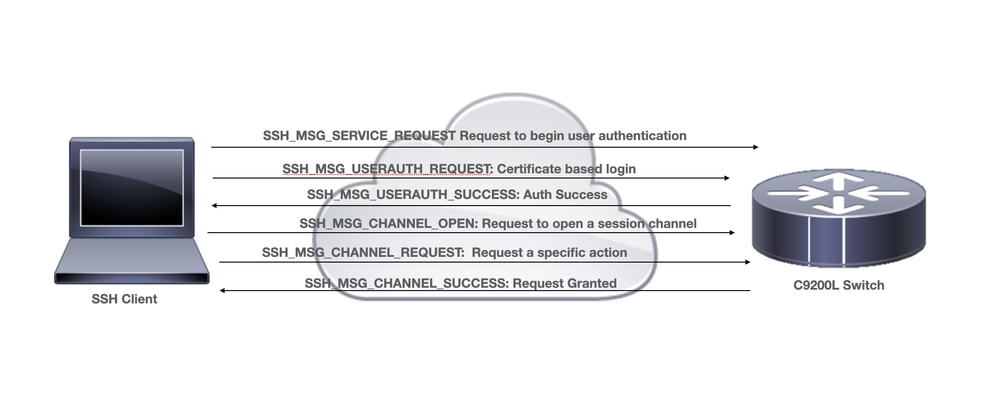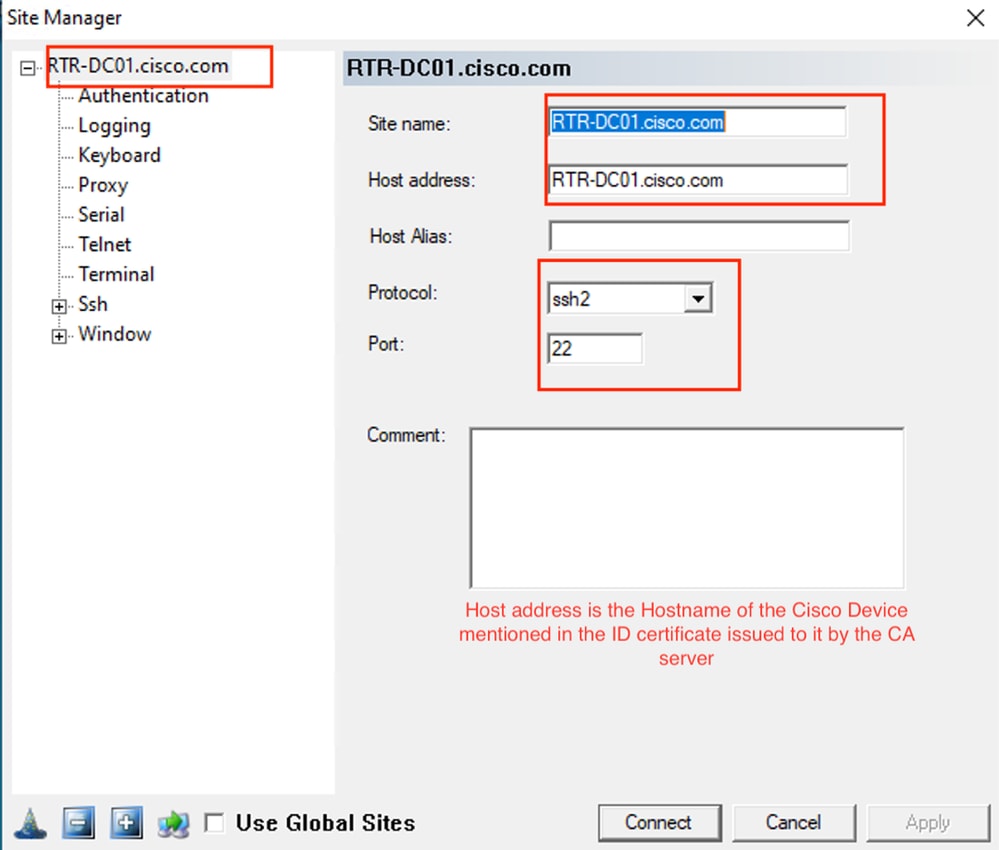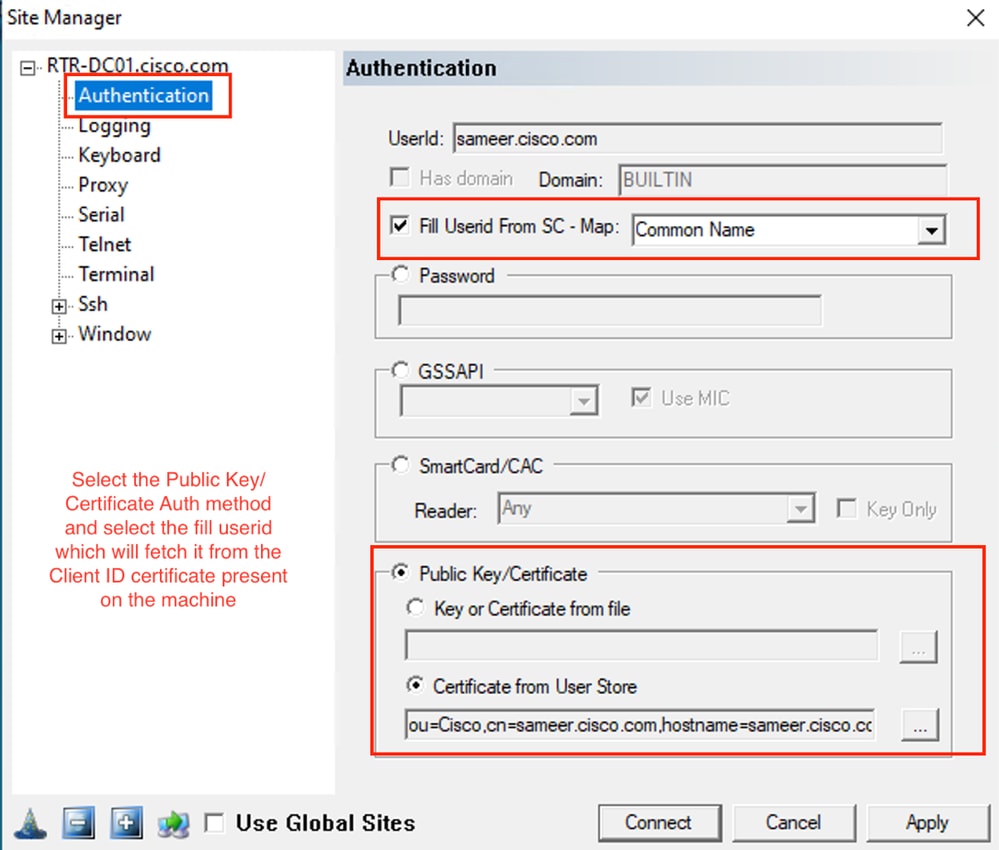Configurazione dell'autenticazione dei certificati per SSH sui dispositivi Cisco IOS XE
Opzioni per il download
Linguaggio senza pregiudizi
La documentazione per questo prodotto è stata redatta cercando di utilizzare un linguaggio senza pregiudizi. Ai fini di questa documentazione, per linguaggio senza di pregiudizi si intende un linguaggio che non implica discriminazioni basate su età, disabilità, genere, identità razziale, identità etnica, orientamento sessuale, status socioeconomico e intersezionalità. Le eventuali eccezioni possono dipendere dal linguaggio codificato nelle interfacce utente del software del prodotto, dal linguaggio utilizzato nella documentazione RFP o dal linguaggio utilizzato in prodotti di terze parti a cui si fa riferimento. Scopri di più sul modo in cui Cisco utilizza il linguaggio inclusivo.
Informazioni su questa traduzione
Cisco ha tradotto questo documento utilizzando una combinazione di tecnologie automatiche e umane per offrire ai nostri utenti in tutto il mondo contenuti di supporto nella propria lingua. Si noti che anche la migliore traduzione automatica non sarà mai accurata come quella fornita da un traduttore professionista. Cisco Systems, Inc. non si assume alcuna responsabilità per l’accuratezza di queste traduzioni e consiglia di consultare sempre il documento originale in inglese (disponibile al link fornito).
Sommario
Introduzione
Questo documento descrive la configurazione di Secure Shell (SSH) sui dispositivi Cisco IOS® XE con certificati X.509v3 per l'autenticazione, in conformità alle linee guida definite nella RFC 6187.
Prerequisiti
Requisiti
Cisco raccomanda la conoscenza dell'infrastruttura PKI (Public Key Infrastructure).
Componenti usati
Le informazioni fornite in questo documento si basano sulle seguenti versioni software e hardware:
- Switch C9200L con Cisco IOS XE versione 17.3.5
- Client SSH Pragma Fortress
Le informazioni discusse in questo documento fanno riferimento a dispositivi usati in uno specifico ambiente di emulazione. Su tutti i dispositivi menzionati nel documento la configurazione è stata ripristinata ai valori predefiniti. Se la rete è operativa, valutare attentamente eventuali conseguenze derivanti dall'uso dei comandi
Premesse
Questo approccio migliora la sicurezza SSH abilitando l'autenticazione basata su certificati, allineando così le procedure di gestione delle chiavi SSH a quelle usate in TLS (Transport Layer Security).
SSH fornisce l'autenticazione reciproca per stabilire una connessione sicura tra client e server. Tradizionalmente, i server vengono autenticati utilizzando le coppie di chiavi Rivest-Shamir-Addleman (RSA). Il client calcola l'impronta digitale della chiave pubblica del server e chiede all'amministratore di verificarla, preferibilmente confrontandola con un valore noto ottenuto tramite un metodo sicuro fuori banda. Tuttavia, questa verifica manuale viene spesso ignorata a causa della sua complessità, aumentando il rischio di attacchi man-in-the-middle (MitM) e indebolendo il modello di fiducia SSH.
La RFC 6187 risolve questi problemi abilitando l'autenticazione basata sui certificati X.509v3, che integra SSH con PKI. Questo approccio migliora la sicurezza e la scalabilità consentendo di stabilire un trust tramite Autorità di certificazione (CA) attendibili, offrendo un'esperienza utente e un modello di trust simili a TLS.
Configurazione
Esempio di rete

Considerazioni sulla distribuzione
- Per utilizzare questa funzione, è necessario un client SSH compatibile con RFC6187.
- Il client SSH e il server negoziano i meccanismi di autenticazione supportati. Tutti i meccanismi di autenticazione precedentemente supportati sul dispositivo possono continuare a funzionare contemporaneamente con i meccanismi di autenticazione basati su x509 per garantire una transizione senza problemi.
- L'amministratore può scegliere di utilizzare il metodo di autenticazione basato su x509 solo per server, solo client o entrambi.
- Per verificare correttamente i dati di autenticazione dell'altra parte, il client e il server devono solo considerare attendibile una CA comune. Ciò significa che solo il certificato della CA che ha firmato il certificato del router deve essere installato nell'archivio certificati attendibili del dispositivo client.
- Il certificato fornisce informazioni sull'identità dell'altra parte (il nome comune e il nome alternativo del soggetto sono in genere utilizzati a tale scopo). Il client deve confrontare il nome host o il nome dell'indirizzo IP del server fornito come input dall'amministratore con i dati di identità disponibili nel certificato presentato. Limita gravemente le opportunità di attacchi di rappresentazione MitM o di altro tipo.
Configurazioni
Dispositivo IOS-XE (server SSH)
Configurare un trust point che contenga il certificato CA e, facoltativamente, il certificato del router.
crypto pki trustpoint pki-server
enrollment pkcs12
subject-name cn=RTR-DC01.cisco.com
revocation-check none
rsakeypair ssh-cert
! The username has to be fetched from the certificate for accounting and authorization purposes. Multiple options are available.
authorization username subjectname commonnameConfigurare i meccanismi di autenticazione consentiti utilizzati durante la negoziazione del tunnel SSH.
! Alorithms used to authenticate server
ip ssh server algorithm hostkey x509v3-ssh-rsa ssh-rsa
! Acceptable algorithms used to authenticate the client
ip ssh server algorithm authentication publickey password keyboard
! Acceptable pubkey-based algorithms used to authenticate the client
ip ssh server algorithm publickey x509v3-ssh-rsa ssh-rsa
Configurare il server SSH in modo da usare i certificati corretti nel processo di autenticazione.
ip ssh server certificate profile
server
trustpoint sign
user
trustpoint verify

Nota: Verificare che il server SSH e il client SSH dispongano del certificato ID emesso dallo stesso server CA.

Nota: Se, ad esempio, un client SSH come il computer Windows ha un certificato ID rilasciato da un'altra CA, importarlo sul server SSH, ossia lo switch Cisco, ed eseguire il mapping del punto di trust al profilo del certificato del server SSH superiore, nella sezione utente.
Pragma Fortress CL (client SSH installato sul computer dell'utente)


Verifica
show ip ssh
SSH Enabled - version 1.99
Authentication methods:publickey,password,keyboard-interactive
Authentication Publickey Algorithms:x509v3-ssh-rsa,ssh-rsa
Hostkey Algorithms:x509v3-ssh-rsa,ssh-rsa
--- output truncated ----
show users
Line User Host(s) Idle Location
1 vty 0 sameer.cisco.com idle 00:02:37 192.168.1.100
Risoluzione dei problemi
Questi debug vengono usati per tenere traccia della sessione completata:
debug ip ssh detail
debug crypto pki transactions
debug crypto pki messages
debug crypto pki validation
Mar 27 15:35:40.103: SSH1: starting SSH control process
! Server identifies itself
Mar 27 15:35:40.103: SSH1: sent protocol version id SSH-1.99-Cisco-1.25
! Client identifies itself
Mar 27 15:35:40.106: SSH1: protocol version id is - SSH-2.0-Pragma FortressCL 5.0.10.4176
! Authentication algorithms supported by server
Mar 27 15:35:40.106: SSH2 1: kexinit sent: kex algo = diffie-hellman-group-exchange-sha1,diffie-hellman-group14-sha1
Mar 27 15:35:40.106: SSH2 1: kexinit sent: hostkey algo = x509v3-ssh-rsa,ssh-rsa
Mar 27 15:35:40.106: SSH2 1: kexinit sent: encryption algo = aes128-ctr,aes192-ctr,aes256-ctr
Mar 27 15:35:40.106: SSH2 1: kexinit sent: mac algo = hmac-sha2-256,hmac-sha2-512,hmac-sha1,hmac-sha1-96
Mar 27 15:35:40.106: SSH2 1: SSH2_MSG_KEXINIT sent
Mar 27 15:35:40.109: SSH2 1: SSH2_MSG_KEXINIT received
Mar 27 15:35:40.109: SSH2 1: kex: client->server enc:aes256-ctr mac:hmac-sha2-256
Mar 27 15:35:40.109: SSH2 1: kex: server->client enc:aes256-ctr mac:hmac-sha2-256
! Client chooses authentication algorithm
Mar 27 15:35:40.109: SSH2 1: Using hostkey algo = x509v3-ssh-rsa
Mar 27 15:35:40.109: SSH2 1: Using kex_algo = diffie-hellman-group-exchange-sha1
Mar 27 15:35:40.109: SSH2 1: SSH2_MSG_KEX_DH_GEX_REQUEST received
Mar 27 15:35:40.109: SSH2 1: Range sent by client is - 1024 < 2048 < 8192
Mar 27 15:35:40.109: SSH2 1: Modulus size established : 2048 bits
Mar 27 15:35:40.121: SSH2 1: expecting SSH2_MSG_KEX_DH_GEX_INIT
Mar 27 15:35:40.121: SSH2 1: SSH2_MSG_KEXDH_INIT received
! SSH Server sends certificate associated with trustpoint "pki-server"
Mar 27 15:35:40.133: SSH2 1: Sending Server certificate associated with PKI trustpoint "pki-server"
Mar 27 15:35:40.133: SSH2 1: Got 2 certificate(s) on certificate chain
Mar 27 15:35:40.135: SSH2: kex_derive_keys complete
Mar 27 15:35:40.135: SSH2 1: SSH2_MSG_NEWKEYS sent
Mar 27 15:35:40.135: SSH2 1: waiting for SSH2_MSG_NEWKEYS
Mar 27 15:35:40.214: SSH2 0: channel window adjust message received 49926
Mar 27 15:35:41.417: SSH2 1: SSH2_MSG_NEWKEYS received
Mar 27 15:35:41.436: SSH2 1: Authentications that can continue = publickey,password,keyboard-interactive
Mar 27 15:35:41.437: SSH2 1: Using method = none
Mar 27 15:35:41.437: SSH2 1: Authentications that can continue = publickey,password,keyboard-interactive
Mar 27 15:35:41.438: SSH2 1: Using method = publickey
! Client sends certificate
Mar 27 15:35:41.438: SSH2 1: Received publickey algo = x509v3-ssh-rsa
Mar 27 15:35:41.438: SSH2 1: Verifying certificate for user 'sameer.cisco.com' in SSH2_MSG_USERAUTH_REQUEST
Mar 27 15:35:41.439: SSH2 1: Verifying certificate for user 'sameer.cisco.com'
Mar 27 15:35:41.439: SSH2 1: Received a chain of 2 certificate
Mar 27 15:35:41.439: SSH2 1: Received 0 ocsp-response
Mar 27 15:35:41.439: SSH2 1: Starting PKI session for certificate verification
! Client certificate is verified by the SSH-Server
Mar 27 15:35:41.444: SSH2 1: Verifying certificate for user 'sameer.cisco.com'
Mar 27 15:35:41.444: SSH2 1: Received a chain of 2 certificate
Mar 27 15:35:41.444: SSH2 1: Received 0 ocsp-response
Mar 27 15:35:41.444: SSH2 1: Starting PKI session for certificate verification
Mar 27 15:35:41.445: SSH2 1: Verifying signature for user 'sameer.cisco.com' in SSH2_MSG_USERAUTH_REQUEST
Mar 27 15:35:41.445: SSH2 1: Received a chain of 2 certificate
Mar 27 15:35:41.445: SSH2 1: Received 0 ocsp-response
! Certificate status verified successfully
Mar 27 15:35:41.446: SSH2 1: Client Signature verification PASSED
Mar 27 15:35:41.446: SSH2 1: Certificate authentication passed for user 'sameer.cisco.com'
Mar 27 15:35:41.446: SSH2 1: authentication successful for sameer.cisco.com
Mar 27 15:35:41.448: SSH2 1: channel open request
Mar 27 15:35:41.451: SSH2 1: pty-req request
Mar 27 15:35:41.451: SSH2 1: setting TTY - requested: height 25, width 80; set: height 25, width 80
Mar 27 15:35:41.452: SSH2 1: shell request
Mar 27 15:35:41.452: SSH2 1: shell message received
Mar 27 15:35:41.452: SSH2 1: starting shell for vty
Mar 27 15:35:41.464: SSH2 1: channel window adjust message received 9
Aug 21 20:07:32.311: CRYPTO_PKI: ip-ext-val: IP extension validation not required
Problemi comuni
Errori di configurazione
La convalida del certificato ha esito positivo per l'utente. Tuttavia, a causa della mancanza del comando obbligatorio authorization nomeutente nomeoggetto nomecomune nella configurazione, l'autenticazione del certificato per l'utente ha esito negativo.
Apr 26 01:35:32.222: SSH1: starting SSH control process
Apr 26 01:35:32.222: SSH1: sent protocol version id SSH-1.99-Cisco-1.25
Apr 26 01:35:32.224: SSH1: protocol version id is - SSH-2.0-Pragma FortressCL 5.0.10.4176
Apr 26 01:35:32.224: SSH2 1: kexinit sent: kex algo = diffie-hellman-group-exchange-sha1,diffie-hellman-group14-sha1
Apr 26 01:35:32.224: SSH2 1: kexinit sent: hostkey algo = x509v3-ssh-rsa,ssh-rsa
Apr 26 01:35:32.224: SSH2 1: kexinit sent: encryption algo = aes128-ctr,aes192-ctr,aes256-ctr
Apr 26 01:35:32.224: SSH2 1: kexinit sent: mac algo = hmac-sha2-256,hmac-sha2-512,hmac-sha1,hmac-sha1-96
Apr 26 01:35:32.224: SSH2 1: SSH2_MSG_KEXINIT sent
Apr 26 01:35:32.234: SSH2 1: SSH2_MSG_KEXINIT received
Apr 26 01:35:32.234: SSH2 1: kex: client->server enc:aes256-ctr mac:hmac-sha2-256
Apr 26 01:35:32.235: SSH2 1: kex: server->client enc:aes256-ctr mac:hmac-sha2-256
Apr 26 01:35:32.235: SSH2 1: Using hostkey algo = x509v3-ssh-rsa
Apr 26 01:35:32.235: SSH2 1: Using kex_algo = diffie-hellman-group-exchange-sha1
Apr 26 01:35:32.235: SSH2 1: SSH2_MSG_KEX_DH_GEX_REQUEST received
Apr 26 01:35:32.235: SSH2 1: Range sent by client is - 1024 < 2048 < 8192
Apr 26 01:35:32.235: SSH2 1: Modulus size established : 2048 bits
Apr 26 01:35:32.246: SSH2 1: expecting SSH2_MSG_KEX_DH_GEX_INIT
Apr 26 01:35:32.246: SSH2 1: SSH2_MSG_KEXDH_INIT received
Apr 26 01:35:32.259: SSH2 1: Sending Server certificate associated with PKI trustpoint “pki-server”
Apr 26 01:35:32.259: CRYPTO_PKI: (A0049) Session started - identity selected (pki-server)
Apr 26 01:35:32.259: SSH2 1: Got 3 certificate(s) on certificate chain
Apr 26 01:35:32.259: CRYPTO_PKI: Rcvd request to end PKI session A0049.
Apr 26 01:35:32.260: CRYPTO_PKI: PKI session A0049 has ended. Freeing all resources.
Apr 26 01:35:32.260: CRYPTO_PKI: unlocked trustpoint pki-server, refcount is 0
Apr 26 01:35:32.273: SSH2: kex_derive_keys complete
Apr 26 01:35:32.274: SSH2 1: SSH2_MSG_NEWKEYS sent
Apr 26 01:35:32.274: SSH2 1: waiting for SSH2_MSG_NEWKEYS
Apr 26 01:35:45.664: SSH2 1: SSH2_MSG_NEWKEYS received
Apr 26 01:35:45.665: SSH2 1: Authentications that can continue = publickey,password,keyboard-interactive
Apr 26 01:35:45.666: SSH2 1: Using method = none
Apr 26 01:35:45.666: SSH2 1: Authentications that can continue = publickey,password,keyboard-interactive
Apr 26 01:35:45.675: SSH2 1: Using method = publickey
Apr 26 01:35:45.675: SSH2 1: Received publickey algo = x509v3-ssh-rsa
Apr 26 01:35:45.676: SSH2 1: Verifying certificate for user 'sameer.cisco.com' in SSH2_MSG_USERAUTH_REQUEST
Apr 26 01:35:45.676: SSH2 1: Verifying certificate for user 'sameer.cisco.com'
Apr 26 01:35:45.676: SSH2 1: Received a chain of 3 certificate
Apr 26 01:35:45.676: SSH2 1: Received 0 ocsp-response
Apr 26 01:35:45.676: SSH2 1: Starting PKI session for certificate verification
Apr 26 01:35:45.676: CRYPTO_PKI: (A004A) Session started - identity not specified
Apr 26 01:35:45.676: CRYPTO_PKI: (A004A) Adding peer certificate
Apr 26 01:35:45.676: CRYPTO_PKI: Added x509 peer certificate - (1249) bytes
Apr 26 01:35:45.676: CRYPTO_PKI: (A004A) Adding peer certificate
Apr 26 01:35:45.676: CRYPTO_PKI: Added x509 peer certificate - (1215) bytes
Apr 26 01:35:45.676: CRYPTO_PKI: (A004A) Adding peer certificate
Apr 26 01:35:45.676: CRYPTO_PKI: Added x509 peer certificate - (921) bytes
Apr 26 01:35:45.676: CRYPTO_PKI: ip-ext-val: IP extension validation not required
Apr 26 01:35:45.677: CRYPTO_PKI: create new ca_req_context type PKI_VERIFY_CHAIN_CONTEXT,ident 37
Apr 26 01:35:45.677: CRYPTO_PKI: (A004A)validation path has 1 certs
Apr 26 01:35:45.677: CRYPTO_PKI: (A004A) Check for identical certs
Apr 26 01:35:45.677: CRYPTO_PKI : (A004A) Validating non-trusted cert
Apr 26 01:35:45.677: CRYPTO_PKI: (A004A) Create a list of suitable trustpoints
Apr 26 01:35:45.677: CRYPTO_PKI: Found a issuer match
Apr 26 01:35:45.677: CRYPTO_PKI: (A004A) Suitable trustpoints are: pki-server,
Apr 26 01:35:45.677: CRYPTO_PKI: (A004A) Attempting to validate certificate using pki-server policy
Apr 26 01:35:45.677: CRYPTO_PKI: EKU validation successful. Cert matches configuration.
Apr 26 01:35:45.677: CRYPTO_PKI: (A004A) Using pki-server to validate certificate
Apr 26 01:35:45.677: CRYPTO_PKI: Added 1 certs to trusted chain.
Apr 26 01:35:45.677: CRYPTO_PKI: Prepare session revocation service providers
Apr 26 01:35:45.677: CRYPTO_PKI: Deleting cached key having key id 50
Apr 26 01:35:45.677: CRYPTO_PKI: Attempting to insert the peer's public key into cache
Apr 26 01:35:45.677: CRYPTO_PKI:Peer's public inserted successfully with key id 51
Apr 26 01:35:45.678: CRYPTO_PKI: Expiring peer's cached key with key id 51
Apr 26 01:35:45.678: CRYPTO_PKI: (A004A) Certificate is verified
Apr 26 01:35:45.678: CRYPTO_PKI: Remove session revocation service providers
Apr 26 01:35:45.678: CRYPTO_PKI: Remove session revocation service providers
Apr 26 01:35:45.678: CRYPTO_PKI: (A004A) Certificate validated without revocation check
Apr 26 01:35:45.678: CRYPTO_PKI: Populate AAA auth data
Apr 26 01:35:45.678: CRYPTO_PKI: Unable to get configured attribute for primary AAA list authorization.
Apr 26 01:35:45.678: CRYPTO_PKI: (A004A)chain cert was anchored to trustpoint pki-server, and chain validation result was: CRYPTO_VALID_CERT_WITH_WARNING
Apr 26 01:35:45.678: CRYPTO_PKI: destroying ca_req_context type PKI_VERIFY_CHAIN_CONTEXT,ident 37, ref count 1
Apr 26 01:35:45.678: CRYPTO_PKI: ca_req_context released
Apr 26 01:35:45.678: CRYPTO_PKI: (A004A) Validation TP is pki-server
Apr 26 01:35:45.678: CRYPTO_PKI: (A004A) Certificate validation succeeded
Apr 26 01:35:45.678: SSH2 1: Could not find username field configured for certificate in trustpoint Err code = 7
Apr 26 01:35:45.678: CRYPTO_PKI: Rcvd request to end PKI session A004A.
Apr 26 01:35:45.678: CRYPTO_PKI: PKI session A004A has ended. Freeing all resources.
Apr 26 01:35:45.679: SSH2 1: Can not decode the certificate Err code = 7
Apr 26 01:35:45.679: SSH2 1: Certificate authentication failed for user 'sameer.cisco.com'
Informazioni correlate
Cronologia delle revisioni
| Revisione | Data di pubblicazione | Commenti |
|---|---|---|
1.0 |
25-Jul-2025
|
Versione iniziale |
Contributo dei tecnici Cisco
- Ekant RaiCisco TAC Engineer
- Rana Sameer Pratap SinghCisco TAC Engineer
 Feedback
Feedback